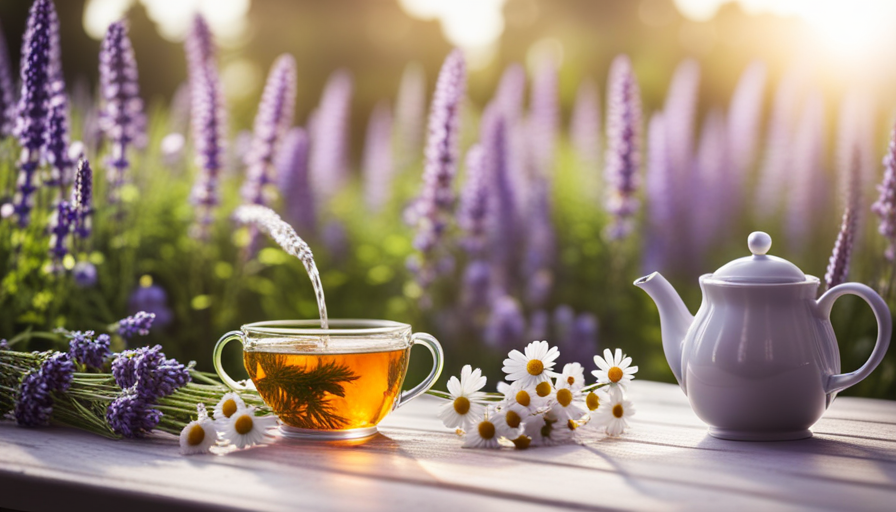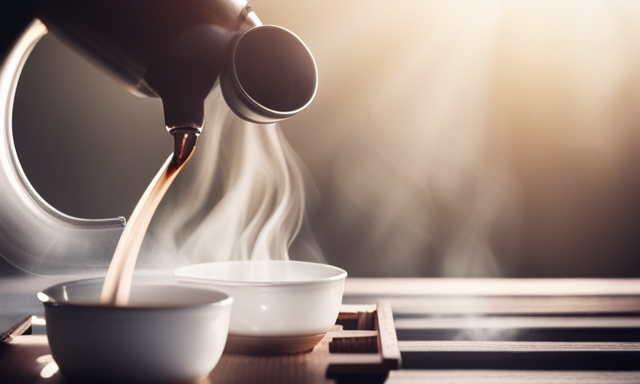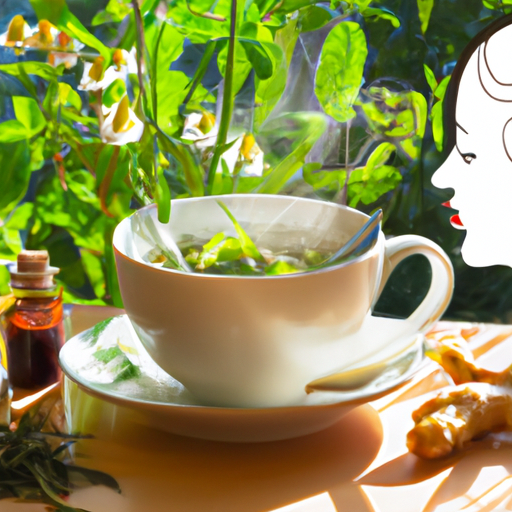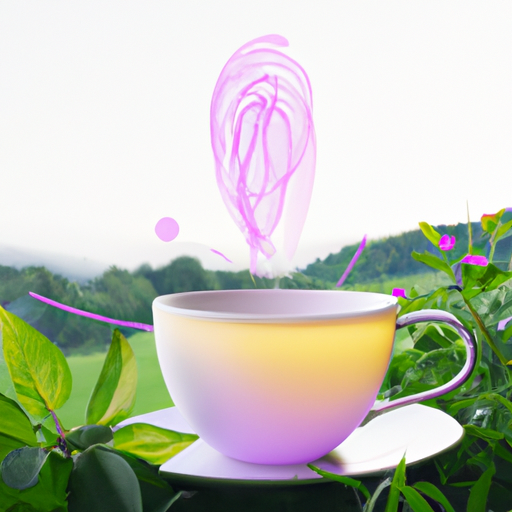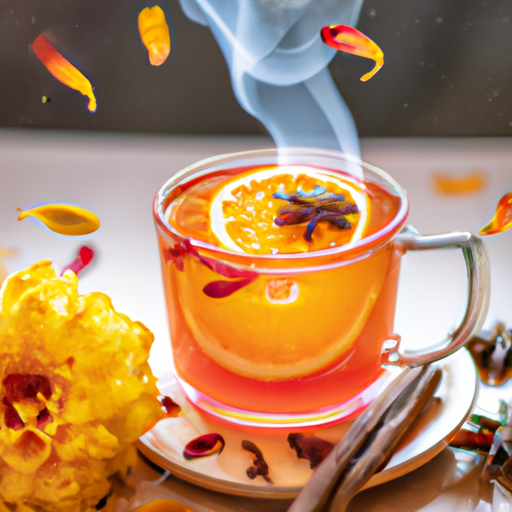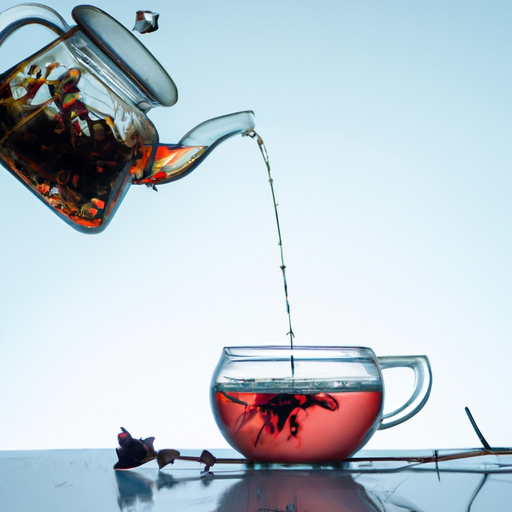Enter the realm of herbal tea, where the gifts of nature are turned into a soothing and nutritious potion. Similar to a soft breeze on a hot summer day, herbal tea envelops your senses, evoking feelings of calm and health.
It is a symphony of flavors, a dance of botanicals, each sip offering a moment of respite in our fast-paced lives.
Herbal tea has a rich history dating back centuries, cherished for its therapeutic benefits and holistic approach to wellness. From calming chamomile to invigorating peppermint, there is a herbal tea for every mood and need.
But what exactly is herbal tea good for?
In this article, we will delve into the world of herbal tea, exploring its various types and uncovering the myriad health benefits it offers. We will also learn how to brew the perfect cup, and discover ways to incorporate herbal tea into our daily routine.
So, join me on this journey as we unlock the secrets of herbal tea and embrace its natural goodness.
Key Takeaways
- Herbal tea has numerous therapeutic benefits, including promoting better sleep, aiding digestion, and improving skin health.
- Different types of herbal tea have specific properties, such as calming effects (chamomile tea), alleviating bloating (peppermint tea), and providing antioxidants (rooibos tea).
- Herbal tea can be used as a natural remedy for common ailments like congestion, coughs, and upset stomachs.
- Incorporating herbal tea into daily routines, skincare, and culinary delights can provide flavor, hydration, and various health benefits.
A Brief History of Herbal Tea
Let’s dive into the fascinating history of herbal tea and discover how it’s been enjoyed for centuries! Herbal tea, also known as tisane, has a rich and diverse history that spans across cultures and civilizations. It’s been consumed for its various health benefits and cultural significance since ancient times.
A brief overview of herbal tea reveals its roots in ancient civilizations such as China and Egypt. In China, herbal teas were traditionally used for medicinal purposes, as well as for their refreshing and soothing qualities. In Egypt, herbal infusions were considered a luxury and were enjoyed by the pharaohs and nobility.
Throughout history, herbal tea has played a significant role in various cultures. It’s been used to promote relaxation, aid digestion, boost the immune system, and enhance overall well-being. Different cultures have their own unique blends of herbal tea, often using locally available herbs and plants.
Understanding the different types of herbal tea allows us to appreciate the vast array of flavors and benefits they offer. From soothing chamomile to invigorating peppermint, each herbal tea has its own unique properties. So let’s delve into the world of herbal tea and explore the various types and their benefits!
Understanding the Different Types of Herbal Tea
Explore the world of herbal infusions, where a tantalizing array of flavors and fragrances awaits your taste buds. Herbal tea comes in many different flavors, each offering its own unique taste and experience.
Here are three types of herbal tea that you can explore:
-
Chamomile: Known for its calming properties, chamomile tea has a delicate floral flavor that soothes both the body and the mind. It is often enjoyed before bedtime to promote relaxation and better sleep.
-
Peppermint: With its refreshing and minty taste, peppermint tea is a popular choice for its digestive benefits. It can help alleviate bloating, indigestion, and stomach discomfort, making it a great after-meal drink.
-
Rooibos: Originating from South Africa, rooibos tea has a naturally sweet and nutty flavor. It is packed with antioxidants and minerals, making it a healthy choice for supporting immune health and overall well-being.
As you delve into the world of herbal teas, you will discover a wide range of flavors that not only satisfy your taste buds but also offer various health benefits.
Now, let’s explore the health benefits of herbal tea in the next section.
The Health Benefits of Herbal Tea
As you delve into the world of herbal infusions, you’ll uncover a myriad of health benefits that can enhance your well-being and invigorate your senses. Herbal teas have been used for centuries to promote healthy skin and aid in digestion.
The natural properties found in herbal teas make them a great addition to your skincare routine. Some herbal teas, such as chamomile and green tea, are known for their anti-inflammatory properties, which can help reduce redness and irritation on the skin. Other herbs like lavender and rosemary have antibacterial properties that can help combat acne and promote a clearer complexion.
When it comes to digestion, herbal teas can be a soothing remedy for a variety of issues. Peppermint tea, for example, has been used to alleviate symptoms of indigestion and bloating. Ginger tea is known to calm an upset stomach and promote healthy digestion. Additionally, herbal teas like fennel and dandelion root can help stimulate the digestive system and aid in the elimination of toxins from the body.
Now that you know about the health benefits of herbal tea, let’s move on to how to brew the perfect cup.
How to Brew the Perfect Cup of Herbal Tea
To achieve the ideal brew, simply steep your chosen herbal infusion for 5 minutes, allowing the flavors to fully develop and release their soothing benefits – you’ll be amazed at how much a warm cup of this natural elixir can improve your overall well-being.
Did you know that a recent study found that regularly consuming herbal tea can significantly reduce stress levels, providing a comforting and calming experience for both the mind and body?
When it comes to brewing techniques, there are a few key factors to consider. First, make sure to use fresh, filtered water to enhance the taste and aroma of your herbal tea. Next, select the appropriate temperature for brewing based on the type of herbal tea you’ve chosen. Some delicate herbal blends, like chamomile or lavender, are best brewed with water that’s been brought to a gentle simmer, while heartier herbal teas, such as ginger or peppermint, can withstand boiling water.
Another important aspect to brewing the perfect cup of herbal tea is the steeping time. As mentioned before, allowing the tea to steep for 5 minutes will ensure that the flavors fully develop, resulting in a rich and satisfying beverage. However, keep in mind that steeping for too long may make the tea taste bitter, so be sure to set a timer to avoid over-extraction.
Now, let’s talk about the wonderful variety of herbal tea flavors available. From soothing chamomile to invigorating peppermint, there’s a herbal tea to suit every palate and mood. Whether you prefer a floral and delicate blend or a bold and spicy infusion, the world of herbal tea offers endless possibilities to explore and enjoy.
Incorporating herbal tea into your daily routine not only provides a delightful and flavorful break from your busy day, but it also offers numerous health benefits. So, in the next section, we’ll delve into creative ways to integrate herbal tea seamlessly into your lifestyle without any hassle.
Incorporating Herbal Tea into Your Daily Routine
Imagine waking up to the soothing aroma of a warm cup of herbal infusion, seamlessly integrated into my morning routine, providing a moment of tranquility before the start of a busy day. Here are a few ways I’ve found to incorporate herbal tea into my daily routine:
-
Incorporating herbal tea into my exercise routine: Before hitting the gym, I like to sip on a cup of energizing herbal tea. It gives me a natural boost of energy and helps me stay hydrated during my workout. Whether it’s green tea to enhance fat burning or chamomile tea to calm my nerves before a yoga session, herbal tea has become an essential part of my fitness regimen.
-
Herbal tea for skincare: As a firm believer in natural remedies, I’ve discovered the amazing benefits of herbal tea for my skin. I use herbal tea as a facial steam to open up my pores and detoxify my skin. I also love using herbal tea-infused toners and face masks to nourish and rejuvenate my complexion. The antioxidants and anti-inflammatory properties in herbal tea have transformed my skincare routine.
Incorporating herbal tea into my daily routine has not only enhanced my overall well-being but has also become a natural remedy for common ailments. [Transition to next section: ‘herbal tea as a natural remedy for common ailments’].
Herbal Tea as a Natural Remedy for Common Ailments
Picture yourself waking up in the morning feeling congested and stuffy. You reach for a warm cup of aromatic herbal infusion, and as you take a sip, you feel the soothing relief that comes from using nature’s remedy to alleviate common ailments.
Herbal tea has long been revered for its medicinal properties, and it can be a natural and effective solution for various health issues.
When it comes to digestive issues, herbal tea can provide much-needed relief. Peppermint tea, for example, has been shown to help soothe an upset stomach and reduce symptoms of indigestion. Ginger tea is another popular choice, known for its ability to ease nausea and improve digestion. By incorporating these herbal teas into your daily routine, you can support a healthy digestive system and enjoy better overall well-being.
In addition to digestive health, herbal tea can also be beneficial for respiratory health. Eucalyptus tea, for instance, has been used for centuries to alleviate symptoms of coughs, colds, and respiratory infections. Its natural expectorant properties can help clear the airways and promote easier breathing. Chamomile tea, on the other hand, can help soothe irritation in the throat and reduce coughing.
Now, let’s dive into another aspect of the benefits of herbal tea: its impact on mental and emotional well-being.
Herbal Tea for Mental and Emotional Well-being
When it comes to mental and emotional well-being, herbal tea can be a great natural remedy. I’ve personally found that certain herbal teas have helped me reduce stress and anxiety.
Additionally, herbal teas like chamomile and green tea have improved my focus and concentration, allowing me to be more productive.
Lastly, sipping on a warm cup of herbal tea like lavender or lemon balm has enhanced my mood and relaxation, providing a sense of calm and tranquility.
Reducing Stress and Anxiety
Feeling stressed and anxious? Herbal tea can help you relax and unwind, providing a soothing escape from the daily pressures of life. Here are a few ways herbal tea can assist in reducing stress and anxiety:
-
Chamomile tea: Known for its calming properties, chamomile tea can help alleviate stress and promote relaxation.
-
Lavender tea: Lavender has been used for centuries to reduce anxiety and promote better sleep.
-
Lemon balm tea: Lemon balm contains compounds that have been shown to reduce anxiety and promote a sense of calm.
-
Peppermint tea: Peppermint tea can help relax the muscles and soothe the mind, reducing stress levels.
In addition to reducing stress, herbal tea can also improve focus and concentration. Transitioning into the next section, it’s important to explore how herbal tea can enhance cognitive function and mental clarity.
Improving Focus and Concentration
Looking to enhance your focus and concentration? Can a simple cup of tea help you stay sharp and alert throughout the day? Herbal tea has been found to have benefits for improving memory and boosting cognitive function. Certain herbs, such as ginkgo biloba and rosemary, have been shown to enhance memory and cognitive performance. These herbs contain antioxidants that protect brain cells from damage and improve blood flow to the brain. In addition, the act of drinking tea itself can promote a sense of calm and focus. The ritual of brewing and sipping tea can be a meditative practice that helps to clear the mind and enhance concentration. So, if you’re looking to improve your focus and cognitive abilities, incorporating herbal tea into your daily routine may be worth a try. Enhancing mood and relaxation can also be achieved through the consumption of herbal tea, providing a holistic approach to overall well-being.
Enhancing Mood and Relaxation
After experiencing the benefits of herbal tea for improving focus and concentration, I was intrigued to explore its other potential advantages. I discovered that herbal tea can also enhance mood and promote relaxation, allowing me to find a sense of peace and tranquility amidst the busyness of life.
The natural compounds found in herbal teas have been shown to have a calming effect on the mind and body, helping to alleviate stress and anxiety. Additionally, herbal teas can enhance creativity and spark inspiration, allowing me to tap into my full artistic potential.
Furthermore, the soothing properties of herbal tea can promote better sleep, ensuring that I wake up feeling refreshed and rejuvenated. As I continue to delve into the world of herbal tea, I’m excited to explore its potential in other areas, such as weight management.
Herbal Tea and Weight Management
To help manage your weight, sipping on herbal tea can transport you to a tranquil oasis of flavor and natural goodness. Herbal tea has been known to support weight management by aiding in digestion and improving sleep quality. Certain herbal teas, such as green tea and oolong tea, have been shown to increase metabolism and promote fat oxidation, which can contribute to weight loss.
Additionally, herbal teas like chamomile and peppermint can help soothe the digestive system, reducing bloating and supporting healthy digestion.
When it comes to weight management, getting adequate sleep is crucial. Poor sleep has been linked to weight gain and obesity. Luckily, herbal teas like valerian root and lavender can promote relaxation and improve sleep quality. By incorporating these teas into your daily routine, you can support your weight management goals while enjoying the calming effects of natural ingredients.
As with any dietary intervention, it’s important to be mindful of possible side effects and precautions. While herbal teas are generally safe for most people, some individuals may experience allergic reactions or interactions with certain medications. It’s always best to consult with a healthcare professional before making any significant changes to your diet or incorporating herbal teas into your weight management plan.
Transitioning into the next section, it’s important to consider possible side effects and precautions when enjoying herbal teas for weight management.
Possible Side Effects and Precautions
When it comes to herbal tea, it’s important to be aware of possible side effects and precautions. Allergic reactions and sensitivities are one potential concern, as certain herbs may trigger an allergic response in some individuals.
Additionally, herbal tea can interact with certain medications, so it’s crucial to consult with a healthcare professional before incorporating it into your routine.
Lastly, pregnant and breastfeeding individuals should consume herbal tea in limited quantities, as some herbs may have adverse effects on pregnancy and breastfeeding.
Allergic Reactions and Sensitivities
Drinking herbal tea can help alleviate symptoms of allergic reactions and sensitivities, providing a soothing relief like a gentle breeze on a hot summer day. Herbal teas contain natural compounds that can reduce inflammation and support the immune system, helping to calm the body’s response to allergens. Some herbs, such as chamomile and peppermint, have been found to have anti-allergic properties and can help relieve symptoms like itching, sneezing, and congestion. However, it is important to note that herbal teas may also cause allergic reactions in some individuals, especially those with known allergies or cross-reactivity with certain plants. It is always wise to consult with a healthcare professional before incorporating herbal teas into your routine, especially if you have any known allergies or are taking medications. Transitioning into the next section, it is important to understand how herbal teas can interact with medications.
Interaction with Medications
Interactions between medications and herbal teas can have unexpected effects on your health. It’s important to be aware of the potential risks and complications that may arise. Some herbal teas can interact with specific medications, altering their effectiveness or increasing the risk of side effects.
For example, St. John’s Wort, a popular herbal tea, can reduce the effectiveness of certain antidepressants and blood thinners. On the other hand, chamomile tea may enhance the sedative effects of medications like sleeping pills and tranquilizers.
It’s crucial to consult with your healthcare provider or pharmacist to understand how herbal teas may interact with your specific medications. By doing so, you can ensure your safety and make informed decisions about incorporating herbal teas into your routine.
Now, let’s explore the limited consumption of herbal teas during pregnancy and breastfeeding.
Limited Consumption during Pregnancy and Breastfeeding
To ensure the safety of your baby, it’s important to be cautious about the amount of herbal tea you consume during pregnancy and breastfeeding. While herbal teas can have numerous health benefits, it’s crucial to remember that some herbs may have adverse effects on pregnancy and breastfeeding. Limited consumption of herbal tea during these phases is recommended to avoid any potential risks.
Certain herbs, such as chamomile, ginger, and peppermint, are generally considered safe in moderation. However, it’s always best to consult with your healthcare provider before incorporating herbal teas into your routine. They can provide personalized advice based on your specific health needs.
By taking a cautious approach, you can enjoy the benefits of herbal tea while ensuring the well-being of both you and your baby.
Now, let’s explore herbal tea blends and recipes to enhance your tea-drinking experience.
Exploring Herbal Tea Blends and Recipes
When it comes to herbal tea, I love the freedom to create my own custom blends. It allows me to tailor the flavors and benefits to my personal taste and health needs.
I also enjoy exploring traditional herbal tea recipes, which have been passed down through generations for their healing properties.
And let’s not forget about the culinary delights that can be created by incorporating herbal tea into recipes. It adds a unique twist to dishes and drinks, making them even more enjoyable and nourishing.
Creating Your Own Custom Blends
Get ready to indulge in the art of tea blending and experience the joy of creating your very own unique herbal tea blends! There’s something truly special about custom tea recipes that are tailored to your specific preferences and needs. Here are four reasons why creating your own blends can be beneficial:
-
Personalized Health Benefits: By blending herbs that target specific health concerns, you can create teas that support your well-being in a holistic way.
-
Enhanced Flavor Profiles: Experimenting with different combinations of herbs allows you to create teas with flavors that perfectly suit your taste buds.
-
Cost-Effective: Making your own herbal tea blends can be more economical than buying pre-packaged teas, especially if you have access to fresh herbs.
-
Creative Expression: Tea blending is an art form that allows you to express your creativity and create teas that are truly unique to you.
Now, let’s transition into exploring traditional herbal tea recipes and discover the rich heritage they hold.
Exploring Traditional Herbal Tea Recipes
After creating your own custom blends, it’s time to explore traditional herbal tea recipes. These recipes have been passed down through generations and hold a cultural significance in many societies. Traditional herbal tea ceremonies have been practiced for centuries, honoring the healing properties and natural benefits of herbs. These ceremonies not only provide a moment of tranquility and relaxation but also serve as a way to connect with nature and appreciate its gifts.
To further understand the cultural significance of herbal tea, let’s take a look at the following table that highlights a few traditional herbal tea recipes from different cultures:
| Culture | Herbal Tea | Benefits |
|---|---|---|
| Chinese | Chrysanthemum Tea | Promotes relaxation and eye health |
| Moroccan | Mint Tea | Aids digestion and refreshes the body |
| Indian | Tulsi Tea | Boosts immunity and relieves stress |
Exploring these traditional recipes allows us to appreciate the diverse ways in which herbal tea is incorporated into daily life. Now, let’s delve into the next section and discover how to incorporate herbal tea into culinary delights.
Incorporating Herbal Tea into Culinary Delights
To elevate your culinary creations, why not infuse the delightful flavors of herbal tea into your dishes? Herbal tea can add a unique and refreshing twist to your desserts.
Try steeping a herbal tea bag in hot water and using it as a base for your homemade ice cream or sorbet. The herbal infusion will infuse the dessert with subtle and aromatic flavors that’ll leave your taste buds delighted.
But herbal tea isn’t just limited to sweet treats. It can also be paired with savory dishes to create a harmonious balance of flavors. For example, try marinating your meat or tofu in a strong herbal tea, such as peppermint or lemongrass, before cooking. The tea won’t only impart a wonderful taste, but it can also help tenderize the protein.
Incorporating herbal tea into your culinary delights is a natural and holistic way to enhance your dishes. So, get creative in the kitchen and experiment with the wonderful flavors of herbal tea.
Frequently Asked Questions
Can herbal tea be consumed by pregnant women or nursing mothers?
Yes, herbal tea can be consumed by pregnant women and nursing mothers. It can help alleviate morning sickness due to its calming and soothing properties. However, it’s important to choose the right herbal teas that are safe during pregnancy and breastfeeding. Some herbal teas like ginger or peppermint can be beneficial for morning sickness, while others like chamomile or fennel can support breastfeeding. It’s always recommended to consult with a healthcare professional before incorporating herbal teas during pregnancy or while breastfeeding.
Is it safe to consume herbal tea while taking medication?
While herbal tea can offer many health benefits, it’s important to consider its potential interactions with common medications. Consuming herbal tea while on medication may pose risks due to potential drug interactions.
It’s crucial to consult with a healthcare professional before combining herbal tea with any medications. They can provide personalized advice based on your specific situation and help ensure your safety.
Always prioritize evidence-based and holistic approaches to wellness to support your overall health and well-being.
Can herbal tea help with allergies or sinus congestion?
Herbal tea can indeed help with allergies and sinus congestion. It has numerous benefits, including its ability to soothe respiratory symptoms and reduce inflammation. Certain herbal teas, such as chamomile or peppermint, have natural antihistamine properties that can alleviate allergy symptoms.
Additionally, herbal teas can provide relief from cold and flu symptoms by reducing congestion and boosting the immune system. Incorporating herbal tea into your daily routine can offer a holistic and natural approach to managing these conditions.
Can herbal tea be used as a substitute for water in hydration?
Herbal tea can be a beneficial substitute for plain water when it comes to hydration. Not only does it provide the necessary fluid intake, but it also offers additional benefits.
Certain herbal teas, like chamomile or mint, have soothing properties that can help calm the body and promote relaxation. Additionally, herbal teas often contain antioxidants and other natural compounds that can support overall health.
However, it’s still important to drink plain water throughout the day to maintain optimal hydration levels.
Are there any herbal teas that can help with digestion or stomach issues?
There are several herbal teas that can work wonders for digestion and stomach issues. Chamomile tea, with its soothing properties, can help ease indigestion and bloating.
Peppermint tea is known for its ability to relieve stomach discomfort and reduce nausea.
Ginger tea can aid in digestion and alleviate stomach cramps.
These herbal teas provide natural remedies for common stomach problems, offering a holistic and evidence-based approach to wellness.
Conclusion
In conclusion, herbal tea is a natural and holistic beverage that offers a plethora of benefits for our overall well-being. It has a rich history and various types available, and has been enjoyed for centuries. Whether you’re seeking to improve your mental and emotional well-being, manage your weight, or simply unwind after a long day, herbal tea can be a great addition to your daily routine. Just remember to brew it with care and explore different blends and recipes to find your perfect cup.
So sit back, sip on some herbal tea, and embrace the natural goodness it provides.

